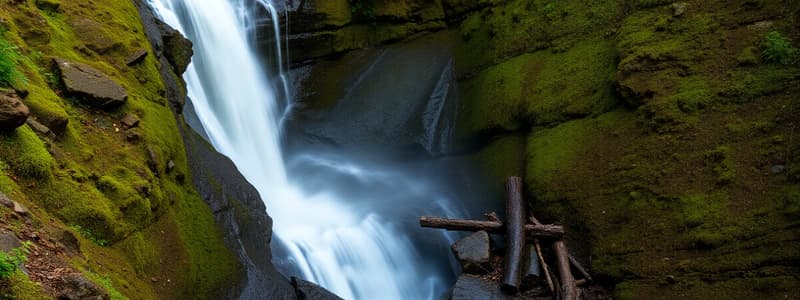Podcast
Questions and Answers
What is an example of a natural phenomenon that can cause significant changes in the landscape?
What is an example of a natural phenomenon that can cause significant changes in the landscape?
- Urban expansion
- Agricultural development
- Road construction
- Volcanic eruption (correct)
Which of the following best characterizes the term 'natural disaster'?
Which of the following best characterizes the term 'natural disaster'?
- A gradual process affecting local ecosystems
- A minor event that has no significant impact
- A predictable event with planned responses
- A sudden event causing widespread destruction (correct)
Which phenomenon is primarily caused by the rotation of the Earth?
Which phenomenon is primarily caused by the rotation of the Earth?
- Eclipse
- Earthquake
- Tides (correct)
- Tsunami
What is the primary source of energy for weather phenomena like storms and hurricanes?
What is the primary source of energy for weather phenomena like storms and hurricanes?
What role does humidity play in natural phenomena such as storms?
What role does humidity play in natural phenomena such as storms?
Flashcards
What causes lightning?
What causes lightning?
Lightning is a massive electric discharge that occurs in the atmosphere, typically during thunderstorms. It happens when there's a build-up of static electricity within thunderclouds, leading to a sudden release of energy as an electrical current.
How does thunder occur?
How does thunder occur?
Thunder is a loud booming sound produced by the rapid heating and expansion of air caused by the intense heat of lightning. The superheated air explodes outwards, creating a shockwave that we hear as thunder.
What is an earthquake?
What is an earthquake?
An earthquake is a sudden, violent shaking of the Earth's surface caused by the release of energy stored within the Earth's crust. This energy release occurs along fault lines, ruptures in the crust, where tectonic plates shift.
What is a volcano?
What is a volcano?
Signup and view all the flashcards
What is a tsunami?
What is a tsunami?
Signup and view all the flashcards
Signup and view all the flashcards
Study Notes
Multiple Choice Questions - Some Natural Phenomena (Class 8)
-
Which of the following is a natural phenomenon related to the movement of Earth?
-
a) Volcanic eruption
-
b) Earthquake
-
c) Rainfall
-
d) Hurricane
-
Which natural phenomena are primarily caused by the interaction between the Sun, Earth, and Moon?
-
a) Thunderstorms and tornadoes
-
b) Volcanic eruptions and earthquakes
-
c) Tides and eclipses
-
d) Floods and landslides
-
What is the primary cause of most earthquakes?
-
a) Volcanic activity
-
b) Movement of tectonic plates
-
c) Human activities
-
d) Changes in weather patterns
-
What are the different types of clouds? Discuss the factors that influence cloudburst and flood occurrences?
-
How do winds, pressure, and temperature contribute to the formation of weather systems like cyclones and thunderstorms?
-
What are the differences between weather and climate?
Study Notes - Some Natural Phenomena (Class 8)
-
Natural Phenomena: Events occurring in nature, often beyond human control. Examples include earthquakes, volcanoes, floods, and cyclones.
-
Earthquakes: Sudden shaking of the ground caused by the movement of tectonic plates beneath the Earth's surface.
-
Tsunamis: Giant waves caused by underwater earthquakes or volcanic eruptions.
-
Volcanic eruptions: Molten rock, ash, and gases expelled from a volcano.
-
Floods: Excess water overflowing from rivers, streams, or oceans onto land.
-
Landslides: Large masses of rock and soil moving down slopes, often triggered by heavy rains or earthquakes.
-
Cyclones (Hurricanes/Typhoons): Rotating storms characterized by strong winds and heavy rainfall, primarily formed over warm ocean waters.
-
Weather: Short-term atmospheric conditions like temperature, rainfall, wind speed, and pressure.
-
Climate: Long-term weather patterns in a region over many years.
-
The Sun-Earth-Moon System: Their interactions cause tides due to gravitational forces. This also causes solar and lunar eclipses due to alignment.
-
Weather Systems: Develop through interactions of temperature, air pressure, and wind patterns.
-
Clouds: Water droplets or ice crystals in the atmosphere; types include cumulus, stratus, cirrus, etc. Factors like temperature, humidity, and air currents determine types and amounts.
-
Cloudbursts: Sudden, heavy rainfall from clouds.
-
Factors influencing Cloudbursts and Floods:
-
Strong winds and pressure gradients
-
Changes in weather patterns
-
High moisture levels in the atmosphere
-
Presence of mountainous terrain
-
Deforestation in nearby locations
-
High water levels contributed from an upstream source like larger rivers
-
Poor drainage and insufficient infrastructure.
-
Importance of Studying Natural Phenomena:
-
To understand these events
-
To predict their effects
-
To develop better mitigation strategies for disaster response.
Studying That Suits You
Use AI to generate personalized quizzes and flashcards to suit your learning preferences.




